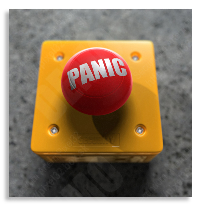One of my YouTube subscribers recommended a book a couple of weeks ago - The Agoraphobia Handbook (by C. Alec Pollard & Elke Zuercher-White). I found it quickly on Amazon and ordered it. I thought it might be useful if I went through the workbook online, using my blog and my YouTube channel to do the worksheets and discuss the concepts.
The book starts with a section on understanding agoraphobia - what it is, what it isn't, the many forms it can take, and how fear can be transformed into phobia. Its interesting and informative, and the authors boil it down to this:
"Agoraphobia is a maladaptive fear of and desire to avoid situations in which you believe a symptom attack may occur and result in incapacitation, overwhelming humiliation, or some other catastrophe."
I find it interesting that the authors talk about symptom attacks, not panic attacks. There is discussion of panic attacks, naturally, but they define agoraphobia as linked to symptom attacks. There are a wide range of symptoms that we've all experienced in one way or other, but they boil symptom attacks down to this:
"[Symptom attacks] .. all have a sudden and rapid onset and are perceived as unpredictable and uncontrollable. In almost every case, the feared symptom attack is perceived as leading to catastrophe" (i.e. death, insanity, loss of control, humiliation, etc.).
There's a short series of questions at the end of the first section. I'll answer them here.
Exercise: How Your Agoraphobia Has Evolved
1. How did your agoraphobia start?
My agoraphobia started when I began being afraid to drive by myself because I was worried that I would have a panic attack in the car. Being afraid to drive alone meant being stuck at home.
2. What symptom or symptom attack did you fear when you first developed agoraphobia?
I feared the typical symptoms of a panic attack. Racing heart, shaking, sweating, hot/cold flashes, dizziness, weakness, feeling short of breath, etc. I was afraid that there was something physically wrong with me and that I would need immediate medical attention to save my life.
3. If you have high anxiety and panic attacks, are they the main source of fear or do they occur because you fear something else?
Yes. Anxiety and panic are the main source of my fear now.
4. What is your main fear in agoraphobic situations now (Is this different from what you feared when you first developed agoraphobia)?
I no longer worry about having a heart attack or stroke or something being physically wrong with me. My main fear now is the fear itself along with everything that comes with it - primarily derealization and depersonalization. I am afraid that I will lose control and either "slip away" (not even sure what that means) or be unable to get myself home or continue with whatever situation I am in at the moment. I do fear "going crazy", and the "slipping away" feeling does lead to being afraid that I am dying, although for no obvious reason (i.e. I know I'm not having a heart attack or stroke).
In my next post, I'll go through the next part of the workbook, which focuses on the four components of agoraphobic fear.
Friday, January 9, 2009
Subscribe to:
Post Comments (Atom)




2 comments:
Hi,
Good luck with the blog. I will keep looking in to see how you are getting on with the book and if it helps you- I hope so.
It is good that the agoraphobia is being broken down because I think everyone's agoraphobia is very different. We have a loose link with other people with agoraphobia but on closer inspection we find the intensity varies and usually the experience too. For example my barrier is not where I am walking to but where I am walking from- ie the safety of my home.
If you don't mind I would like to answer those 4 questions too to see how they vary from your own answers- or not:
1. I had a panic attack in the car about 10 miles from home and struggled to drive back.
2. Solely breathing problems to begin with and I had no idea it was panic. I thought I had a respiratory problem and pestered the doctors constantly with it. My fear was that if I went too far and it got bad I would not be able to breathe.
3. Solely the fear of another panic attack and having to cope with breathing difficulties as a result.
4. My fear now, probably as then, is the experience itself. It is something I hate and don't want to experience so the fear is of having to endure it again.
Maybe our answers are not too different.
All the best
Nechtan
Very interesting. I had heard of that book, but didn't buy it. (Too many books, not enough funds.) My wife doesn't know how her agoraphobia started - which is unusual - and makes it difficult to avoid it happening again. Like you, she's moved on to fearing fear itself.
Post a Comment